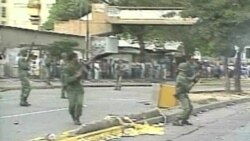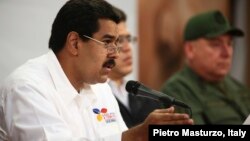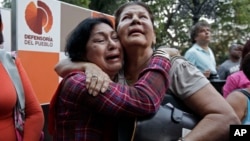Venezuelan officials say President Hugo Chavez has died after a long struggle with cancer.
Vice President Nicolas Maduro announced the death on national television Tuesday. He urged the Venezuelan people to show strength and courage, and to be united and fulfill the expectations of "this great leader."
Foreign Minister Elias Jaua has declared seven days of national mourning. He says says Chavez will lie in state at a military academy before a funeral Friday.
The 58-year-old Chavez had been treated in Cuba for cancer before returning to Caracas last month. Officials say he came down with a severe infection after strong chemotherapy in a Caracas military hospital.
Chavez had cancer in his pelvis. He has not been seen in public since December and missed his inauguration for another term in January.
The secretary general of the Organization of American States, Jose Miguel Insulza, sent his condolences to the Venezuelan people, calling this a time of great sorrow. The OAS will hold a special meeting in memory of President Chavez.
Vice President Maduro Tuesday accused Venezuela's enemies of attacking the president with cancer. He did not say how that could have been done.
Also Tuesday, Venezuela expelled two U.S. diplomats, accusing them of meeting with military officers and plotting to destabilize the government.
The two diplomats are air attaches - U.S. Air Force officers who are stationed in the embassy.
A statement from the U.S. State Department rejected the Venezuelan claim about the diplomats and calls accusations that the United States was involved in causing Mr. Chavez's cancer absurd.
President Barack Obama said in a statement after the death was announced that the United States reaffirms its support for the Venezuelan people and is committed to polices that promote democracy, and human rights.
Path to Politics
Chavez once dreamed of becoming a professional baseball player, but instead he entered the world of politics. During his lifetime, the controversial president courted figures such as Fidel Castro of Cuba, Iran's Mahmoud Ahmadinejad and then-Libyan leader Moammar Gadhadi.
As an army paratrooper in 1992, Chavez led an unsuccessful coup against then-president Carlos Andres Perez, and he spent time in jail for plotting the failed coup. Chavez's political fortunes later changed. He was elected president of oil-rich Venezuela in 1998, running on a populist platform and pledging to wipe out poverty and corruption.
He considered himself a revolutionary and said he was inspired by his political mentor, Fidel Castro, who held power for close to 50 years in Cuba. Critics often accused Chavez of steering Venezuela toward a Cuban-style one-party dictatorship.
Political analyst Luis Vicente Leon says Venezuela became undemocratic under the president's growing authoritarian rule.
"We rediscovered the needs of the poor classes, we rediscovered that it was necessary to tend to their problems," he said. "What are the negatives? Well, I think the most important of all is that Venezuela's democracy nowadays is quite a poor democracy."
Critic of the U.S.
Chavez was a fierce critic of the United States, which he often referred to as "the empire," and he accused the U.S. of supporting coup attempts against him - charges Washington denied. Back in 2006, he famously referred to then-U.S. president George W. Bush as "the devil" during a speech before the United Nations General Assembly.
"Yesterday the devil was here at this very spot. This podium where it is now my turn to speak still smells of sulfur," Chavez said.
As president, Chavez nationalized major companies across a range of industries -- from oil, steel and cement, to electricity and telecommunications. He also directed funds from the country's oil wealth to social programs for the needy. Additionally, he used electoral victories to extend the presidential term to six years and remove term limits.
Michael Shifter, an analyst with the Inter-American Dialogue in Washington, says the president's leftist policies hurt long-term economic development and contributed to rising crime. But he says Chavez will be remembered as a champion of the people who used his country's vast oil wealth to provide the poor with free housing and health care.
"There is nobody around who has the charisma and the ability to connect to Venezuelans the way Chavez did. Chavez as a figure and the memory of Chavez won't disappear. That will help sustain the movement," Shifter said.
Chavez also earned the ire of critics by cracking down on the opposition media. The human rights body of the Organization of American States voiced concern about the use of the punitive power of the state to silence opponents in Venezuela.
In 2008, Venezuela and Ecuador broke diplomatic relations with Bogota after Colombian troops raided a Colombian FARC rebel camp in Ecuador, killing a rebel commander and several other people.
Ties between Venezuela and Colombia soured over accusations that Venezuela harbors FARC rebels. Venezuela denied financing and supporting the FARC. Chavez, however, helped win the release of some Colombians held hostage by the FARC.
Health Problems
In June 2011, President Chavez was diagnosed with cancer and subsequently underwent surgeries in Cuba to remove tumors from his pelvic area. He then underwent chemotherapy both in Cuba and Venezuela for the disease. The president did not disclose what kind of cancer was being treated, but insisted he would be ready to run for re-election in October 2012. Chavez won a fourth term, but underwent a fourth cancer operation in Cuba in December. He was not seen in public after that, although a photograph of him with two daughters was released in the weeks prior to his death.
Chavez was to have been sworn in this past January, but the event did not occur because he was not well enough for the occasion.
Vice President Nicolas Maduro announced the death on national television Tuesday. He urged the Venezuelan people to show strength and courage, and to be united and fulfill the expectations of "this great leader."
Foreign Minister Elias Jaua has declared seven days of national mourning. He says says Chavez will lie in state at a military academy before a funeral Friday.
The 58-year-old Chavez had been treated in Cuba for cancer before returning to Caracas last month. Officials say he came down with a severe infection after strong chemotherapy in a Caracas military hospital.
Chavez had cancer in his pelvis. He has not been seen in public since December and missed his inauguration for another term in January.
The secretary general of the Organization of American States, Jose Miguel Insulza, sent his condolences to the Venezuelan people, calling this a time of great sorrow. The OAS will hold a special meeting in memory of President Chavez.
Vice President Maduro Tuesday accused Venezuela's enemies of attacking the president with cancer. He did not say how that could have been done.
Also Tuesday, Venezuela expelled two U.S. diplomats, accusing them of meeting with military officers and plotting to destabilize the government.
The two diplomats are air attaches - U.S. Air Force officers who are stationed in the embassy.
A statement from the U.S. State Department rejected the Venezuelan claim about the diplomats and calls accusations that the United States was involved in causing Mr. Chavez's cancer absurd.
President Barack Obama said in a statement after the death was announced that the United States reaffirms its support for the Venezuelan people and is committed to polices that promote democracy, and human rights.
Path to Politics
Chavez once dreamed of becoming a professional baseball player, but instead he entered the world of politics. During his lifetime, the controversial president courted figures such as Fidel Castro of Cuba, Iran's Mahmoud Ahmadinejad and then-Libyan leader Moammar Gadhadi.
As an army paratrooper in 1992, Chavez led an unsuccessful coup against then-president Carlos Andres Perez, and he spent time in jail for plotting the failed coup. Chavez's political fortunes later changed. He was elected president of oil-rich Venezuela in 1998, running on a populist platform and pledging to wipe out poverty and corruption.
He considered himself a revolutionary and said he was inspired by his political mentor, Fidel Castro, who held power for close to 50 years in Cuba. Critics often accused Chavez of steering Venezuela toward a Cuban-style one-party dictatorship.
Political analyst Luis Vicente Leon says Venezuela became undemocratic under the president's growing authoritarian rule.
"We rediscovered the needs of the poor classes, we rediscovered that it was necessary to tend to their problems," he said. "What are the negatives? Well, I think the most important of all is that Venezuela's democracy nowadays is quite a poor democracy."
Critic of the U.S.
Chavez was a fierce critic of the United States, which he often referred to as "the empire," and he accused the U.S. of supporting coup attempts against him - charges Washington denied. Back in 2006, he famously referred to then-U.S. president George W. Bush as "the devil" during a speech before the United Nations General Assembly.
"Yesterday the devil was here at this very spot. This podium where it is now my turn to speak still smells of sulfur," Chavez said.
Hugo Chavez
Hugo Chavez- 58 years old
- Gained national attention in a failed 1992 coup
- President since 1999
- Ousted by a coup for two days in 2002
- Started cancer treatment in 2011
- Vocal critic of the U.S. and supporter of Cuba, Iran, Syria
Michael Shifter, an analyst with the Inter-American Dialogue in Washington, says the president's leftist policies hurt long-term economic development and contributed to rising crime. But he says Chavez will be remembered as a champion of the people who used his country's vast oil wealth to provide the poor with free housing and health care.
"There is nobody around who has the charisma and the ability to connect to Venezuelans the way Chavez did. Chavez as a figure and the memory of Chavez won't disappear. That will help sustain the movement," Shifter said.
Chavez also earned the ire of critics by cracking down on the opposition media. The human rights body of the Organization of American States voiced concern about the use of the punitive power of the state to silence opponents in Venezuela.
In 2008, Venezuela and Ecuador broke diplomatic relations with Bogota after Colombian troops raided a Colombian FARC rebel camp in Ecuador, killing a rebel commander and several other people.
Ties between Venezuela and Colombia soured over accusations that Venezuela harbors FARC rebels. Venezuela denied financing and supporting the FARC. Chavez, however, helped win the release of some Colombians held hostage by the FARC.
Health Problems
In June 2011, President Chavez was diagnosed with cancer and subsequently underwent surgeries in Cuba to remove tumors from his pelvic area. He then underwent chemotherapy both in Cuba and Venezuela for the disease. The president did not disclose what kind of cancer was being treated, but insisted he would be ready to run for re-election in October 2012. Chavez won a fourth term, but underwent a fourth cancer operation in Cuba in December. He was not seen in public after that, although a photograph of him with two daughters was released in the weeks prior to his death.
Chavez was to have been sworn in this past January, but the event did not occur because he was not well enough for the occasion.








